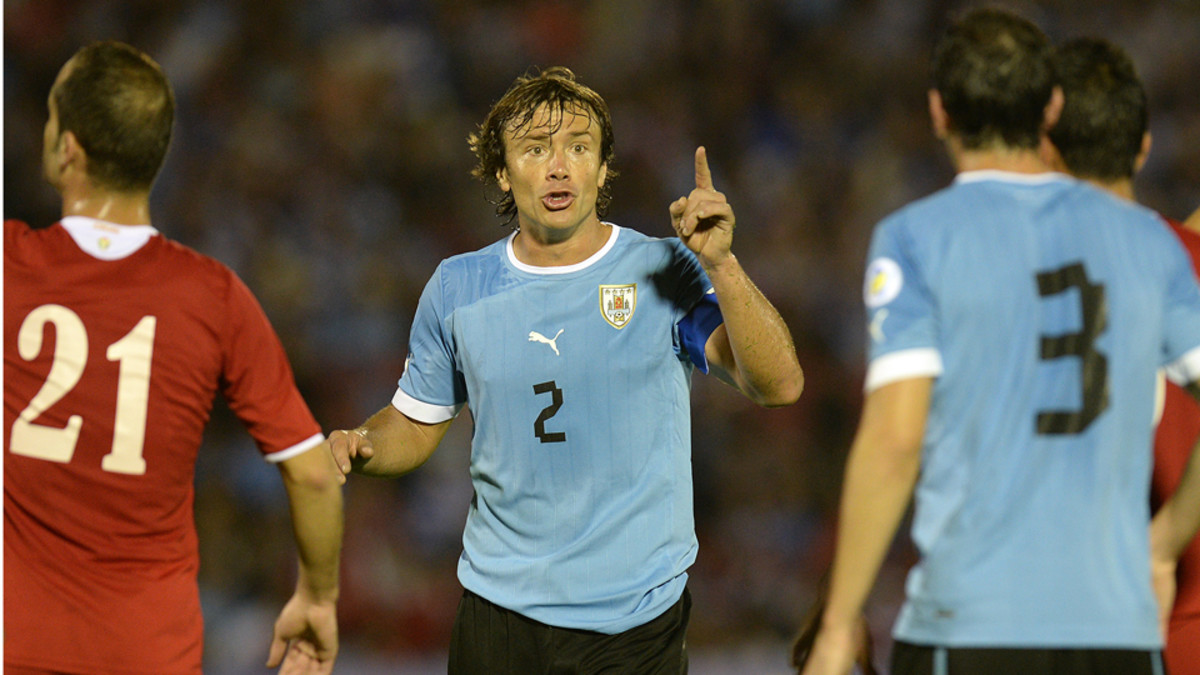
Looking to Lugano for leadership, Uruguay eyes another World Cup run
Are leaders born or made?
Atletico Madrid coach Diego Simeone said his teachers made him class captain from an early age as they sensed that quality in him. For Diego Lugano, who is captaining Uruguay for the second time in a World Cup, two stories suggest that his path to leadership was a different one.
The first was in November 2004, and Lugano was making his second appearance for Uruguay. It was a tough World Cup qualifier against Paraguay at the Centenario, Uruguay's national stadium, and at halftime the score was 0-0. Lugano sat down in the locker room, took off his shirt and put it on the floor. He was sitting between captain Paolo Montero and defender Dario Rodriguez.
They both looked at him with angrily. The message was clear: never leave the team shirt on the floor, always treat it with respect. When Lugano told the story to El Grafico's Diego Borinsky, a shiver went down his spine as he remembered it. The shirt is a symbol, whether things are going well or badly, and that is the most important thing.
Another tough lesson came one year later, just after Australia beat Uruguay on penalty kicks to qualify for the 2006 World Cup. It was the cruelest way to miss out, and when Lugano arrived home one day later, he was expecting some sympathy from his father Alfredo, a former captain at Club Libertad. He got none. Alfredo was waiting at the airport and told Diego not to go home but to walk around the city to see what mood people were in.
"I have never forgotten what I saw," Lugano told Borinsky. "Kids walked to school with their heads down, buses driving with the radio off. Total silence everywhere. It was like a funeral."
Lugano understands what the Uruguay national team means to the country, but the feeling ahead of Brazil is no different to four years ago, when Uruguay reached the semifinal.
LUIS SUAREZ: SI Magazine profile | Who's the best player he's ever seen?
"Just like then, our primary objective is to get out of the group," Lugano said of La Celeste, whose opening match is against Costa Rica in a rematch of the World Cup qualifying playoff Uruguay won in 2010. "We have a tough group, with three previous world champions in it, and if we get through it, then we will be candidates to win the World Cup."
Lugano is still upset that he missed that semifinal against the Netherlands four years ago. He limped out of the quarterfinal against Ghana with a knee injury and thinks there could have been a different outcome had Luis Suarez and Jorge Fucile not been suspended as well. "I was the least important player missing," he says.
25 Players to Watch at the World Cup
Cristiano Ronaldo, Portugal
Lionel Messi, Argentina
Ángel di María, Argentina
Luis Suárez, Uruguay
Arjen Robben, Netherlands
Neymar, Brazil
Wayne Rooney, England
Mario Balotelli, Italy
Andrea Pirlo, Italy
Didier Drogba, Ivory Coast
Karim Benzema, France
Keisuke Honda, Japan
Paul Pogba, France
Eden Hazard, Belgium
Yaya Touré, Ivory Coast
Michael Bradley, United States
Manuel Neuer, Germany
Arturo Vidal, Chile
Alexis Sánchez, Chile
Xavi, Spain
Andrés Iniesta, Spain
Luka Modrić, Croatia
Robin van Persie, Netherlands
Edin Džeko, Bosnia-Herzegovina
Mesut Özil, Germany
Lugano has barely played for Paris Saint-Germain and West Bromwich Albion in the last two years, but his place in the national team has never been in doubt. His younger teammates call him "Mister," the name traditionally given to a coach. In this case, Oscar Washington Tabarez is called El Maestro.
Even when he is not picked, Lugano is present, like at the London 2012 Olympics. Lugano was not selected as one of the three over-age players, but desperate not to miss Uruguay's first Olympic qualification for 84 years, he asked PSG for permission to join the group.
His defensive partner is Atletico Madrid center back Diego Godin, fresh from winning La Liga (he scored the title-winning goal against Barcelona on the final day of the season) and coming within one minute of capturing the Champions League (again, it was Godin's header that put Atletico on the verge of success).
Both men, for different reasons, are undroppable. The extra pressure on Uruguay is the Brazil factor; in 1950, Uruguay's win over Brazil in the Maracana, known as "the Maracanazo,' has scarred the host nation to this day.
"It's a beautiful story and is part of our history and identity," added Lugano. "But to think we have a divine right to do well this summer because we are in Brazil: well, that's just wrong. We have a tough challenge ahead, but it could be amazing too. I have faith in us."





























